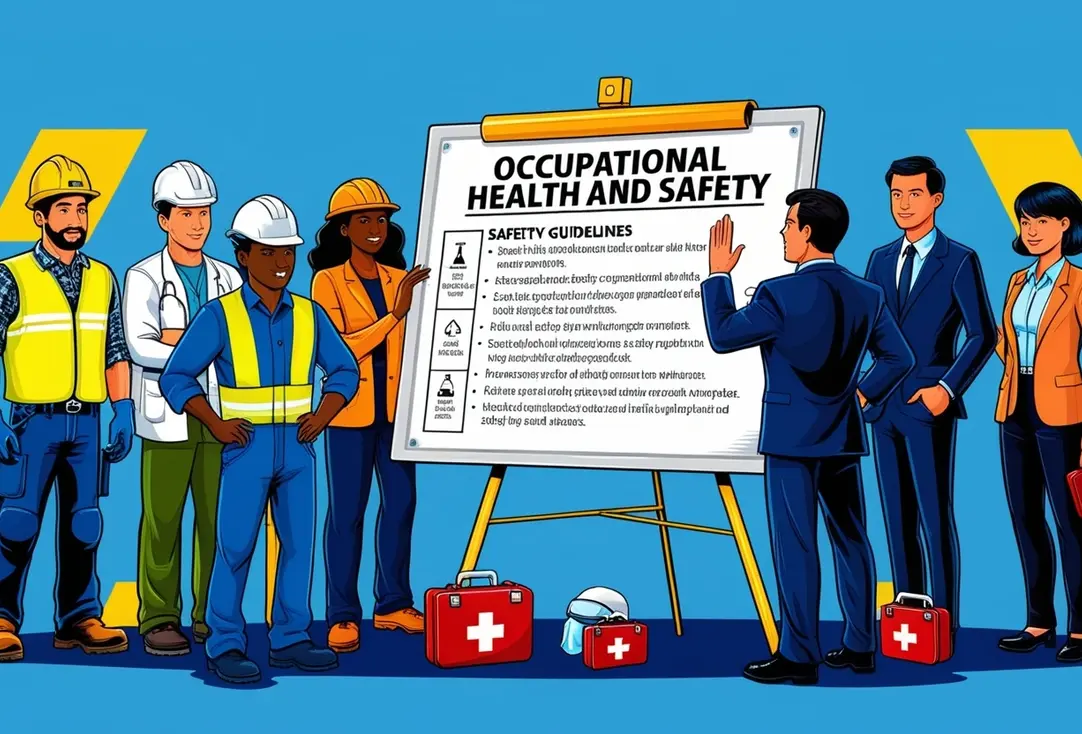Occupational Health and Safety (OHS) is more than just a requirement for compliance. It is the backbone of a successful, productive, and respected workplace. Here are 10 Importance of Occupational Health and Safety in your workplace as an employer of labor:
Importance of Occupational Health and Safety
1. Protects Employee Lives
The most important reason for OHS is to protect your employees from harm. No one should come to work and leave with injuries or worse, lose their life. By implementing health and safety measures, you ensure that your workers can go home safely to their families every day.
Simple steps like providing safety gear, training workers on hazard identification, and regularly maintaining equipment can save lives. When employees see that their well-being is a top priority, they feel valued and are more likely to stay loyal to the company.
2. Reduces Workplace Accidents and Injuries
Workplace accidents not only harm people but also disrupt operations. When someone gets injured, it creates downtime, affects morale, and often results in costly investigations or lawsuits. By promoting safety practices, like clear signage, proper machine guarding, and regular risk assessments, you can significantly reduce these risks.
Think of OHS as an investment. A proactive safety program reduces accidents, ensuring smoother day-to-day operations and fewer interruptions.
3. Improves Employee Productivity
A safe workplace is a productive workplace. Employees who feel safe perform better because they are less distracted by concerns about their health. For example, providing ergonomic workstations can reduce strain injuries and boost focus.
When workers see that management prioritizes safety, they feel more secure, leading to higher morale and increased efficiency. Simply put, when employees know they are cared for, they care more about their work.
4. Enhances Company Reputation
Organizations with strong health and safety practices earn respect from employees, customers, and the community. When word spreads that your company takes care of its people, it’s easier to attract and retain top talent. Additionally, customers and clients prefer working with businesses that show responsibility toward their workforce.
A positive reputation can even help you win contracts, as many clients look for safety-compliant partners. Your commitment to OHS showcases your professionalism and values.
5. Reduces Costs Associated with Accidents
Workplace accidents come with hidden costs, such as medical bills, legal fees, compensation claims, and lost productivity. By preventing incidents through safety measures, you save money that would otherwise be spent dealing with these issues.
For example, investing in fire extinguishers and training workers on their use is far cheaper than dealing with the aftermath of a fire. Prevention is always more cost-effective than reaction.
6. Ensures Legal Compliance
Every organization must comply with health and safety laws. Failing to do so can result in hefty fines, legal action, or even shutdowns. Compliance is not optional—it’s a necessity to keep your business running.
By prioritizing OHS, you ensure that your company meets legal standards. Regular audits, proper record-keeping, and employee training can help you avoid violations and maintain a clean safety record.
7. Build a Positive Workplace Safety Culture
When safety is a core value, it fosters trust and collaboration among employees. A strong safety culture means everyone—from top management to entry-level workers—takes responsibility for creating a safe work environment.
Encouraging open communication about hazards and solutions helps build a team spirit. Workers feel empowered to speak up and suggest improvements, knowing their concerns will be taken seriously.
8. Prepares the Organization for Emergencies
Emergencies, such as fires, chemical spills, or natural disasters, can happen without warning. Having a solid health and safety plan ensures that your organization is prepared to handle these situations effectively.
Emergency drills, evacuation plans, and first-aid training can save lives and reduce panic during crises. Being prepared also minimizes damage to your assets and ensures faster recovery.
9. Promotes Long-Term Business Sustainability
A focus on health and safety isn’t just about the present; it ensures the long-term success of your business. Accidents, lawsuits, and high employee turnover can cripple an organization over time. By fostering a safe and healthy workplace, you create a foundation for steady growth.
Think of OHS as a long-term strategy that protects your workforce, builds loyalty, and secures the future of your company.
10. Boosts Employee Retention and Satisfaction
Employees want to work in environments where they feel safe and valued. A strong commitment to health and safety shows workers that you care about their well-being, not just their output.
This leads to higher job satisfaction and reduces turnover. When employees stay longer, you save on recruitment and training costs while benefiting from a more experienced and dedicated workforce.
Conclusion
Occupational Health and Safety is not just about meeting legal requirements or avoiding accidents; it’s about creating a thriving, productive, and respected workplace. By prioritizing OHS, your organization can protect lives, improve productivity, reduce costs, and build a positive culture that benefits everyone.
Now is the time to make health and safety a top priority. Start small, stay consistent, and watch the benefits grow—for your employees and your business as a whole.
Related Posts
13 Reasons Why Safety Is Important
Why Is Health And Safety Important In A Fitness Environment?
Why Coffee Shop Health and Safety Policy is Important
